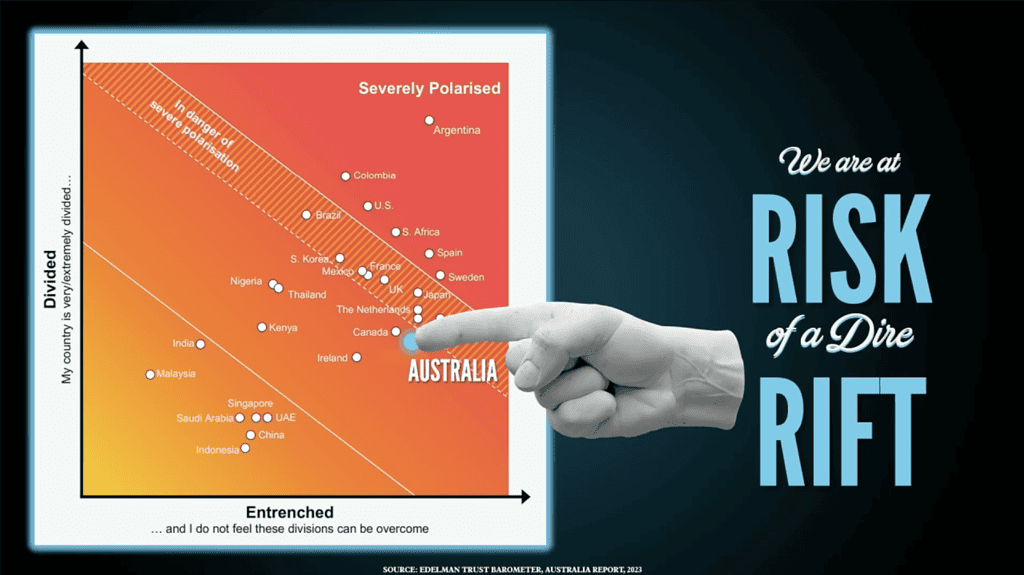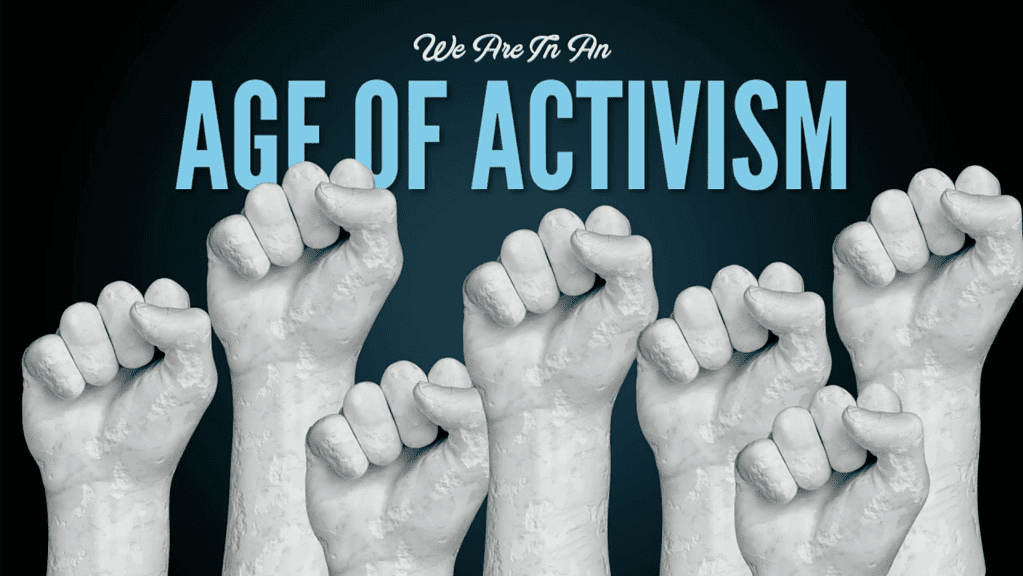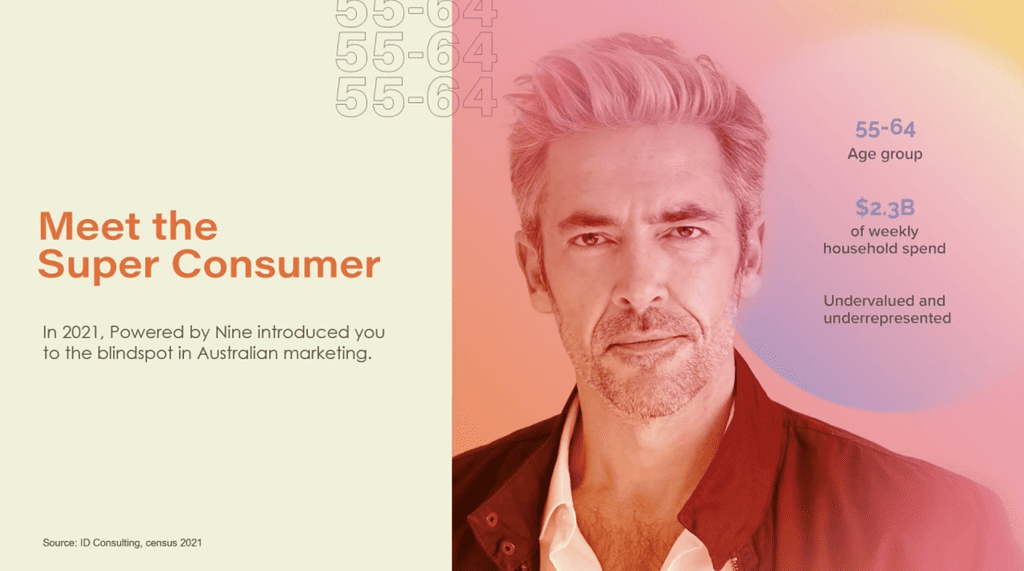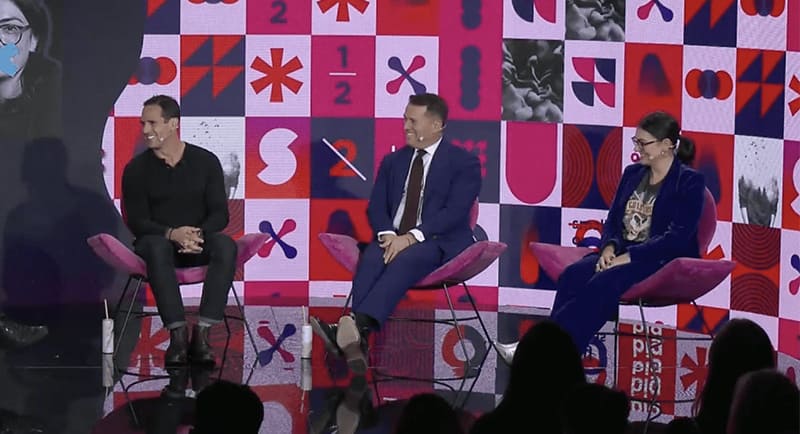Nine has swung open the door on its sixth Big Ideas Store, launching a week of speakers, workshops, research, and an immersive pop-up taking over the Beta events space in Sydney.
Mediaweek will be across all the week’s sessions, bringing readers a rundown of every idea – big or small.
Find out more about The Big Ideas Store here.
See Also: Nine’s Big Ideas Store 2023: Day One recap
See Also: Nine’s Big Ideas Store 2023: Day Two recap
See Also: Nine’s Big Ideas Store 2023: Day Three recap
See Also: Nine’s Big Ideas Store 2023: Day Four recap
Initiative Presents Culture Shock: Grey Matters
By Jasper Baumann

This session was hosted and introduced by Melissa Fein, CEO of Initiative.
Ahead of the panel, Fein introduced the seminar and discussed what the term culture shock means in the context of this seminar. She described it as a deep dive into topics where other agencies will not go.
She then passed the reigns onto Sam Geer, national managing director – Initiative who introduced the term ‘Grey Matters’. The term relates to the fact that we are living in an increasingly black-and-white world in the sense that an age of activism is upon us. Geer explains that every person seems to have a loud opinion and voice and platform to amplify that voice in culture. He explains that because of this, it is driving extremes in our culture such as extreme ends of the political spectrum whether that be black or white, hence ‘Grey Matters’.
Geer then introduces the panel who dive into the controversial topic of cancel culture and how businesses, brands and individuals navigate a world filled with outrage and social unacceptability.
The panel included Nine’s Today Show co-host Karl Stefanovic, Pernod Ricard’s global marketing director Eric Thomson and Josie Rozenberg-Clarke, head of editorial at Pedestrian.

When asked what has changed in culture to form the acceleration and this particularly galvanising moment for cancel culture, Clarke said the rise of social media is a significant catalyst.
“I think in the past celebrities and brands could do problematic things and they’ll be kind of untouchable. The conversations would happen at the water cooler in an office or maybe some boomer would write into the newspaper and be like, I don’t like what Carl said. But now, with social media, celebrities and brands have access to people, so they are going rogue. Also, people can comment and people can start having the conversation in real time very quickly. It can blow up globally in literally hours,” she said.
The next question was for Stefanovic who was asked how he deals with the pressure of looking down the barrel of the camera to millions of people a day and if he feels like he’s walking a tightrope in terms of being careful of what he says live on air.
Stefanovic said he’s been doing it for 18 years, so he’s learned not to think too hard about it.
“I’ve been in massive trouble with niche organisations, you kind of learn how to massage around certain topics and the only way to do it is through trial and error. When you’ve messed up, you apologise and move on and learn your lesson through it. I’ve been cancelled by my own Nine network they cancelled me for a year and let me tell you that it was pretty nice. I was in Paris for a couple of weeks. But I think there is much more of a fine line.”
Genuinely, you just have to be yourself. Through experience, I’ve learned where I can go hard and where I can go softer and massage particular topics. But I mean, every day, things can happen,” he said.
The discussion then switched towards if the rise of cancel culture has resulted in the broader market producing more beige advertising.
Thomson said it may have potentially.
“I think it’s really important for us as marketers, and people who are stewards of brands to really understand the values in which the company we work for has and understand what the expectations of consumers of our brands are. I think if you have a clear understanding of those two things, it’s actually not that difficult to make really smart marketing decisions.
I think the problem becomes when brands decide to speak on a particular topic that could be controversial and they have no history with and their corporate enterprise-level structures aren’t in order. I think that they have no real right to play there.
I think if you understand your consumer, I think you can push the boundaries in a really safe way, and you don’t have to produce super safe things,” he said.
The Rise of the Super Consumer
By Jasper Baumann

The last session of this year’s Big Ideas Store was hosted and introduced by Toby Boon, Powered by Nine’s director of strategy & client solutions.
Ahead of the panel, Boon introduced the seminar as a discussion around how in 2021, Nine introduced the Superconsumers – an under-valued audience of 55+ Australians worth $2.3bn of household spend a week. Now, he explains new research explores how an expanded cohort of 45+ consumers is emerging as the most influential and powerful consumer set in Australia.
After the introduction, Boon passed it over to the panel which included Russel Howcroft, Breakfast Co-host, 3AW, Lisa Day, director of content partnerships, total publishing & audio – Powered, Chris Colter, chief strategy & product officer – Initiative and Mitesh Khatri, head of consumer intelligence and consulting, ANZ – GFK.
The first question was for Khatri and was asked what he thought about the findings of this new research.
“I think there are a lot of elements in the research that probably isn’t new news, but has been accelerated over the last couple of years. I think, stepping out of our generational box around how we think influence and what that means is important. We tend to think Instagram and someone being paid to actually promote a product but I think the term ‘Influencer’ needs to be broadened to include this cohort,” he said.
When asked what his view on the research was, Colter said it was really validating.
“Initiative as an agency has a real passion for tackling unconscious biases that exist in the industry and general marketing myopia. When the research says it’s because of the way that we’ve always done that, I think there is a truth to that. What I do enjoy about their research is just how it ends up breaking some of those myths, I love the fact that we’re living longer, which means we’re living younger longer, and marketers still haven’t picked up on that and I also think that we can be quite guilty of stereotypically planning to engage these audiences.
When we think of the channels we choose the tactics we execute. They tend to be quite traditional conservative, but what we’ve seen in that research is that their media consumption and what we know as an agency as well is that their media consumption is quite tech-forward. It’s quite innovative. So I think for me, that is really reaffirming,” he said.
